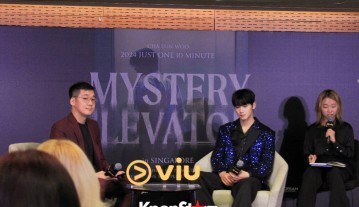Venice Film Festival: Winner of Top Venice Prize Kim Ki Duk (Pieta), Who is He?
Director Kim Ki Duk, who received the Golden Lion Award at the 69th Venice Film Festival, is one of the most historically important Korean directors of all time, who started as an outsider in the industry.
He has never studied film academically and was raised in a very unstable environment, making his life seem like another one of his famous movies. He was born in 1960 in a small village in Kyungsangbukdo and has revealed in numerous interviews that his family was not well off.
Because of his family situation, he wasn't able to attend a normal high school but went to an agricultural school instead. After graduating, he tried to get a job but he wasn't able to do that easily so worked at a factory and a construction work site.
In 2001, during a press conference for his movie "Bad Guy," he said, "I was a worker for the construction company that used to be where this theater is right now so it's unbelievable that my movie is screening here."
Due to his less than flashy background, he always referred to himself as a monster that grew up on inferiority. In order to overcome his insecurity, he volunteered for the Marines and was sent to France, where he thought of a new life for himself.
He has originally worked at a part of Seoul drawing people's portraits, and he did that in the south of France, by a beach, in order to feed himself. He began to grow slowly as an artist in this process.
In France, he watched his first two movies ever at age 32, one of which was "The Silence of the Lambs." This changed his life forever.
He came back to Korea and began writing movie screenplays and in 1995, he wins a competition held by the Korean Film Council, with a scenario called "Jaywalk." In 1996, he produces and directs his first movie called "Crocodile." This all happened in 4 years after watching his first film.
His movies which often portrayed the bottom rung of the social ladder, violence, sexual violence and perverted psyches always brought along controversy but his pieces began to draw attention internationally.
In 1998, his third project "Birdcage Inn" is chosen as the opening piece for the Berlin Film Festival and his next film "The Isle" is chosen to be a part of the Venice Film Festival in 2000. He wins the World Cinema Award at Sundance Film Festival. A movie that he filmed in 3 hours, called "Real Fiction" is also chosen for the Moscow Film Festival.
His first commercially successful film "Bad Guy," is chosen to be part of the competition at Berlin in 2001.
He works with top star Jang Dong Gun on "The Coast Guard," which drew a lot of attention. As his projects began to draw attention, top stars began contacting him so that they would want to work with him.
He said, "Jang Dong Gun, Lee Na Young, Zhang Ziyi and others reached out to be first. Willem Dafoe recently reached out to me but I haven't been able to find anything for him at the moment." He has received messages from actors, who leave him notes at his hotel room when he attends film festivals.
In 2003, his film "Spring, Summer, Fall, Winter and Spring" received the highest honors for movies in Korea and is recognized domestically as a very influential director.
"Samaritan Girl" in 2004 wins him the Director award at the Berlin Film Festival and "3-Iron" wins him the same at the Venice Film Festival. In one year, he received awards at two worldwide film festivals, which put him up with the greatest directors of all time.
Despite his international recognition, he was always labeled with, the phrase 'non-commercial, art-house movies.' He has openly talked about the cons of being an art-house director and has even said negative things about "The Host," which was the most successful movie at one point.
He makes another movie called "A Movie is a Movie," which draws the most number of viewers for his movies and was directed by his protégé, Jang Hun. However, Jang Hun leaves him for a bigger distribution company and during a shoot for "Dream," his lead actress Lee Na Young is almost killed on set. After that, Kim Ki Duk disappears from the public eye, going into the countryside to live quietly.
During his 3 year hiatus, he makes a movie called, "Arirang," a documentary of himself thinking about the meaning of movies and the human existence. He receives an award for the movie at the 2011 Cannes Film Festival, Berlin and Venice. He is the first Korean director to be given honors from all three of the big 3 film festivals.
With this honor, he revives his career and this brings him to "Pieta" and his Golden Lion Award in Venice. "Pieta" is his 18th project and will leave his name as the director who has won highest honors at the big 3 film festivals.















